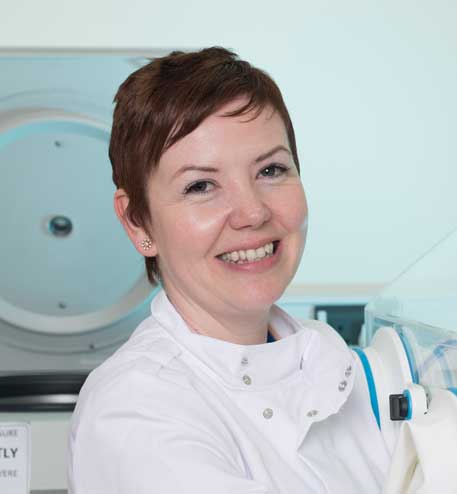Thursday, 17 April 2025
A research team at the University of Nottingham has received £1.3 million from the Medical Research Council (MRC) to develop a new type of treatment for inflammatory bowel disease (IBD), a condition affecting over 5 million people worldwide.
Current therapies often fail to fully relieve symptoms for many patients, especially those also suffering from serious gut infections like Clostridioides difficile, which can worsen inflammation and lead to more severe outcomes.
The team, led by Dr Tanya Monaghan from the School of Medicine, is harnessing the power of microRNAs—tiny molecules that help regulate the immune system—by packaging them into microscopic particles called nanoparticles. These are designed to deliver treatment directly to damaged parts of the gut, reducing inflammation and protecting cells. Early results in lab models have been very promising, showing targeted action with no signs of harm.
Now entering a critical development stage, the project brings together a cross-disciplinary team of experts from leading UK institutions.
Collaborators include Professor Cameron Alexander and Dr David Scurr at the University of Nottingham, Dr Pratik Gurnani at University College London, Professor Roisin Owens at the University of Cambridge, Dr Anna Seekatz at Clemson University, USA and Dr Christos Polytarchou—who will co-lead the project at Nottingham Trent University—alongside Maria Hatziapostolou, Dr Sarah Kuehne, and Professor Lesley Hoyles.
The team will refine and test these therapies in cutting-edge systems that mimic the human gut, while also exploring the potential to treat other conditions, such as inflammatory conditions of the gut-brain axis and neurodegenerative diseases.
If successful, this groundbreaking technology could lead to a new generation of personalised treatments, offering real hope to IBD patients who do not respond to current therapies
 Dr-Tanya-Monaghan
Dr-Tanya-Monaghan
Dr Tanya Monaghan, Associate Professor in the School of Medicine at the University of Nottingham, and project lead, said: “We urgently need more targeted and effective treatments for people living with inflammatory bowel disease and more severe forms of C. difficile infection. This project takes us a step closer to personalised therapies that can not only reduce inflammation but also help repair and protect the gut. I’m excited about the potential impact this could have for patients who currently have limited options.”
Dr Christos Polytarchou, Associate Professor at Nottingham Trent University, said: “This collaboration brings together world-class expertise to push the boundaries of RNA-based therapies. Our goal is to develop precision nanomedicines that not only treat inflammation more effectively, but also address the underlying molecular drivers of disease. It’s a unique opportunity to translate pioneering science into real clinical solutions.”
Story credits
More information is available from Dr Tanya Monaghan in the School of Medicine at tanya.monaghan@nottingham.ac.uk
Notes to editors:
About the University of Nottingham
Ranked 97 in the world and 17th in the UK by the QS World University Rankings, the University of Nottingham is a founding member of Russell Group of research-intensive universities. Studying at the University of Nottingham is a life-changing experience, and we pride ourselves on unlocking the potential of our students. We have a pioneering spirit, expressed in the vision of our founder Sir Jesse Boot, which has seen us lead the way in establishing campuses in China and Malaysia - part of a globally connected network of education, research and industrial engagement.
Nottingham was crowned Sports University of the Year by The Times and Sunday Times Good University Guide 2024 – the third time it has been given the honour since 2018 – and by the Daily Mail University Guide 2024.
The university is among the best universities in the UK for the strength of our research, positioned seventh for research power in the UK according to REF 2021. The birthplace of discoveries such as MRI and ibuprofen, our innovations transform lives and tackle global problems such as sustainable food supplies, ending modern slavery, developing greener transport, and reducing reliance on fossil fuels.
The university is a major employer and industry partner - locally and globally - and our graduates are the third most targeted by the UK's top employers, according to The Graduate Market in 2024 report by High Fliers Research. Alongside Nottingham Trent University, we lead the Universities for Nottingham initiative, a pioneering collaboration between the city’s two world-class institutions to improve levels of prosperity, opportunity, sustainability, health and wellbeing for residents in the city and region we are proud to call home. More news…